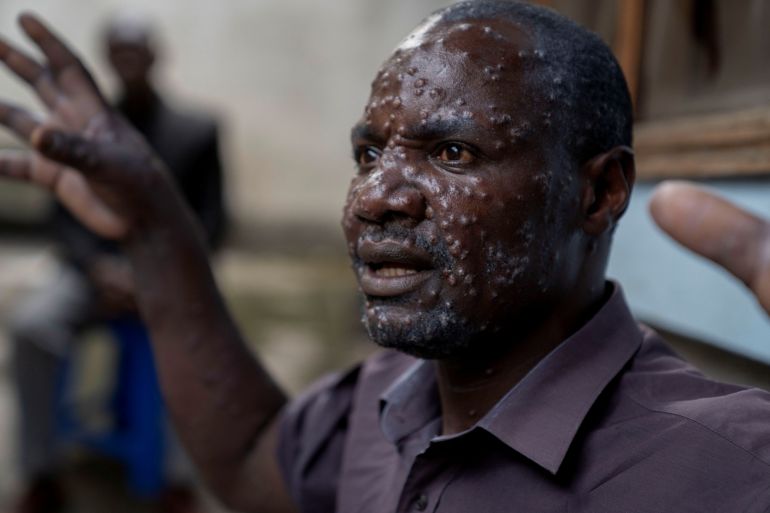Africa CDC declares mpox a public health emergency
Africa’s top public health body acts over outbreak of mpox that spread from the Democratic Republic of Congo to neighbouring countries.
Jean Kakuru Biyambo, from the Muja internally displaced persons camp, is seen at the Goma General Hospital where he has been receiving treatment against mpox in North Kivu province, Democratic Republic of Congo [Arlette Bashizi/Reuters]Published On 13 Aug 202413 Aug 2024
The African Union’s health watchdog has declared a public health emergency over the growing mpox outbreak on the continent, saying the move is a “clarion call for action”.
“I declare with a heavy heart but with an unyielding commitment to our people, to our African citizens, we declare mpox as public health emergency of continental security,” Jean Kaseya, head of the Africa Centres for Disease Control and Prevention (Africa CDC), said during an online media briefing on Tuesday.
Keep reading
list of 4 itemslist 3 of 4
South Africa reports second mpox death this week
end of list
“Mpox has now crossed borders, affecting thousands across our continent, families have been torn apart and the pain and suffering have touched every corner of our continent,” he said.
According to CDC data as of August 4, there had been 38,465 cases of mpox and 1,456 deaths in Africa since January 2022.
“This declaration is not merely a formality, it is a clarion call to action. It is a recognition that we can no longer afford to be reactive. We must be proactive and aggressive in our efforts to contain and eliminate this threat,” said Kaseya.
Mpox is transmitted through close contact and causes rashes, flu-like symptoms and pus-filled lesions. Most cases are mild but it can kill. The disease can be dangerous for children, pregnant women and those with suppressed immune systems.
This colorised electron microscope image provided by the National Institute of Allergy and Infectious Diseases shows mpox particles, in red, in an infected cell [File: NIAID via AP]
The outbreak has swept through several African countries, particularly the Democratic Republic of Congo (DRC), where the virus was first discovered in humans in 1970.
The outbreak, which has since spread to neighbouring countries, began with the spread of an endemic strain, known as clade 1. But the new variant, known as clade 1b, appears to spread more easily through routine close contact.
The Africa CDC warned last week that the viral infection’s rate of spread was alarming. It said that more than 15,000 mpox cases and 461 deaths were reported on the continent this year so far, representing a 160 percent increase from the same period last year.
A milder version of the virus spread to more than 100 countries in 2022, largely through sexual contact, prompting the World Health Organization (WHO) to declare a public health emergency of international concern, its highest level of alert.
The WHO ended the emergency 10 months later, saying the health crisis had come under control.
The WHO said on Tuesday from Geneva that the emergency committee will discuss the spread of a new clade, or variant, on Wednesday as they deliberate on whether a Public Health Emergency of International Concern (PHEIC) should be declared.
Emergencies of this kind were declared in 2020 in response to the coronavirus pandemic and in 2022, on account of an earlier mpox outbreak. The aim is to alert health authorities to a rise in cases.
